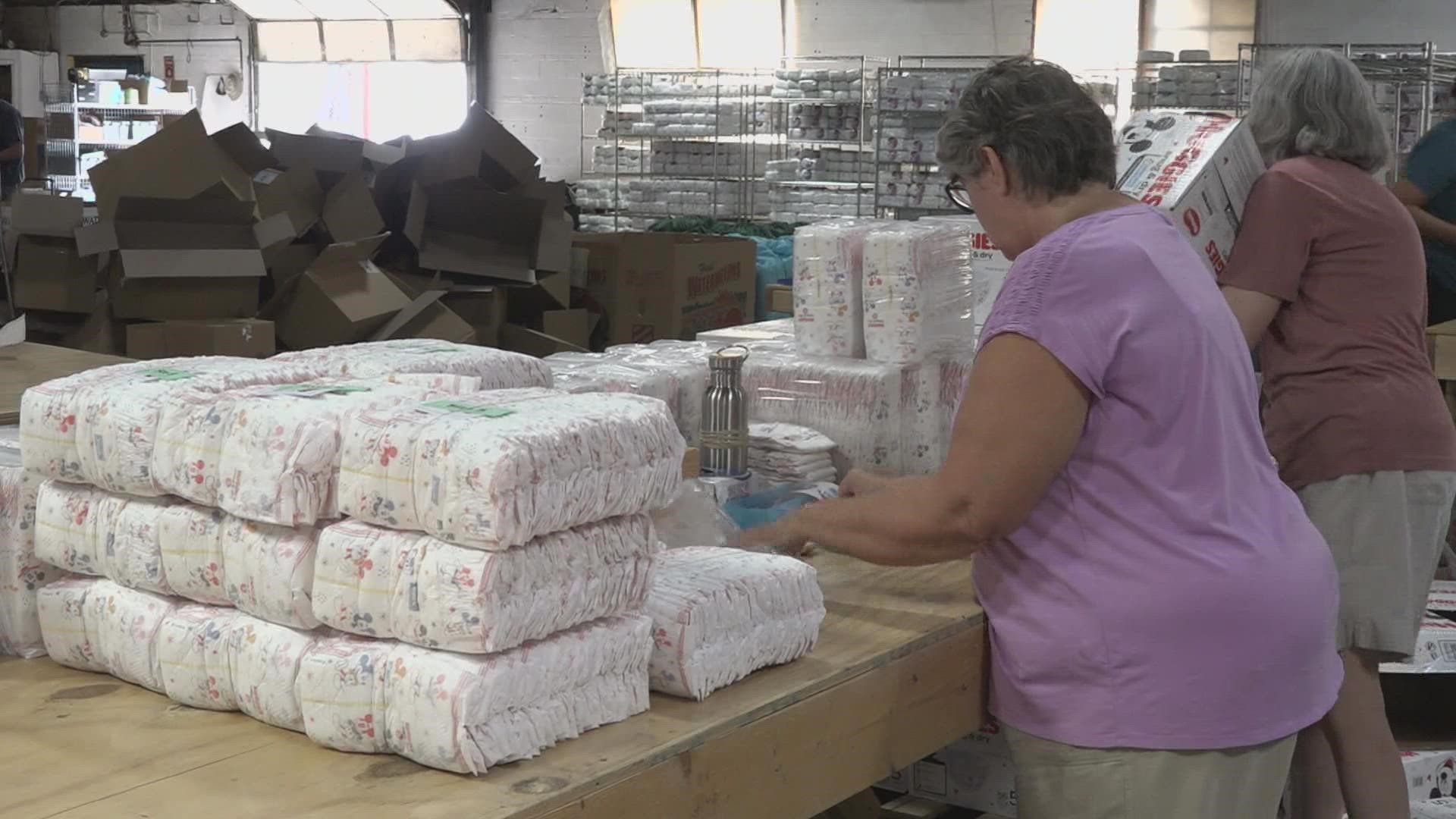SAINT LOUIS, Mo. — The economy is taking a toll on the youngest Americans, as more families struggle with basic needs, like diapers. The National Diaper Bank now says one in three Americans struggle with buying diapers, which now costs more than $1,000 a year per child.
It's something to consider given that $1,000 is 15% of the take-home income of a person earning minimum wage. Compare that with food, clothing, rent, medicine, transportation and childcare needs, you can see why caregivers are struggling to make ends meet.
It's something that Mary Schepers realizes as a grandmother and a volunteer for the St. Louis Area Diaper Bank. She buys diapers for her grandson occasionally and said she is shocked to see how expensive they've become and how hard some sizes are to come by. With competing costs, inflation, COVID and supply chain issues, caregivers are stressed.
"A lot of the sizes are hard to find," said Schepers. "Everything is coming up for them at one time, I frankly don't know how they do it sometimes."
The struggle is evident at the diaper bank.
"One of our partners, who is a food pantry, told us a story about a mom who came to pick up her monthly food distribution and told our partner that she wanted to get the diapers because her baby had not been changed for that morning and hadn't been changed since the night before," said Muriel Smith, the diaper bank's executive director.
Keeping infants and toddlers clean and dry is a health issue. Statistics show that moms who don't have enough diapers are three times more likely than their peers to suffer from depression and anxiety. Data also shows that children left in soiled diapers are uncomfortable and irritable, and fussy babies are at an increased risk of child abuse.
It's all part of a national crisis as caregivers struggle with inflation, job loss or shortages. And in states like Missouri and Illinois, consumers are still taxing diapers even though there has been a trend for other states to tax them at a lesser rate or not at all.
The St. Louis Area Diaper Bank is now on track to donate 1 million diapers this year, which is a dramatic increase.
That's partly because the St. Louis County Library District has been one of the bank's partners, one of the largest by far. The library is now adding a sixth location to help more families in need. Libraries have gone from being an emergency-only site to a way of life.
"It means one less trip in a car or one less visit someplace if they're already at the library," said Kristen Sorth, the executive director of the St. Louis County Library.
Parents who register could get diapers for free indefinitely. It's a sign of the times as libraries across the country have grown into actual community centers, offering books along with free meals, wifi devices, notary services, diapers, period supplies and much more.
"I think that people come to the library for answers," said Sorth. "And we look for those answers."
Finding the answers to diaper insecurity is a bit harder.
"It is definitely a health crisis," said Smith.
But as long as donations come in, the diapers go out. And caregivers can feel a little relief, for now.
"Not even people who normally need help – I mean, don't know how they do it," said Schepers. "So I'm really happy I volunteer."
The St. Louis Area Diaper Bank takes diapers and monetary donations. It prefers money because it can buy diapers cheaper than most people can at the store.
The six library diaper distribution sites are:
- Florissant Valley Branch, 195 New Florissant Rd., S., Florissant, MO 63031
- Grand Glaize Branch, 1010 Meramec Station Rd., Manchester, MO 63021
- Lewis & Clark Branch, 9909 Lewis-Clark Blvd., St. Louis, MO 63136
- Natural Bridge Branch, 7606 Natural Bridge Rd. St. Louis, MO 63121
- Parkview Branch, 8400 Delport Dr., St. Louis, MO 63114
- Weber Road Branch, 4444 Weber Rd. St. Louis, MO 63123

